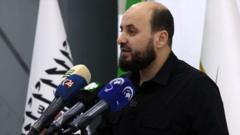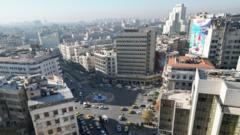Mohammed al-Bashir outlines plans for governance and collaboration with former officials as he seeks international support for a new inclusive administration in post-Assad Syria.
**Syria's Transition: New PM Promises Stability Amid Leadership Change**

**Syria's Transition: New PM Promises Stability Amid Leadership Change**
The newly appointed transitional Prime Minister of Syria emphasizes the need for calm after the overthrow of Bashar al-Assad.
In the wake of President Bashar al-Assad's removal from power, Mohammed al-Bashir, the newly appointed Prime Minister of Syria’s transitional government, has stated the importance of allowing the nation's citizens to "enjoy stability and calm." Al-Bashir, who once led the rebel administrative efforts in north-west Syria, has been designated to govern until March 2025 by the Islamist militant group Hayat Tahir al-Sham (HTS) and its allies.
During a recent meeting in Damascus, al-Bashir engaged with both his new ministers and those from Assad's former regime to discuss effective transition of authority and essential administrative functions. This development coincides with statements from the UN envoy for Syria, who emphasized that the rebels need to convert their positive rhetoric into tangible actions on the ground. Meanwhile, U.S. Secretary of State Antony Blinken conveyed that Washington would back a future Syrian administration, provided it emerges from a legitimate and inclusive process that respects minority rights.
The political turbulence in Syria can be traced back to the brutal suppression of a peaceful pro-democracy movement in 2011, leading to a devastating civil war with hundreds of thousands dead and millions displaced. Al-Bashir previously held little recognition outside HTS’s controlled regions, having worked as an electrical engineer before the conflict. He was appointed Prime Minister of the Salvation Government (SG) in January, an administrative body created by HTS to govern areas under its control.
Bashir's leadership is critical, especially after the fallout of HTS’s recent military advances in Aleppo and the establishment of local governance structures, which facilitated the return of public services. The SG has functionally operated like a state, encompassing various ministries and organizations while adhering to Islamic governance protocols. Despite facing limited resources in regions like Idlib, HTS officials maintain high operational experience.
This week, al-Bashir met with both his ministers and former officials to prepare for restructuring the government and expediting the establishment of a constitutional system expected to cater to the needs of the Syrian population. Concurrently, rebel leader Hasan Abdul Ghani announced the capture of Deir al-Zour city from Kurdish forces, indicating shifts in territorial control.
Life in Damascus appeared to gradually normalize following days of conflict, with streets bustling and commerce resuming. Local sentiments echoed a desire for a unified and peaceful nation, articulated by cleric Sheikh Abdul Rahman al-Kouky, emphasizing the need for a system founded on justice and equal opportunity.
International representatives, including UN special envoy Geir Pedersen, stressed the necessity for broad representation within the new governance framework to prevent future conflicts. He acknowledged the challenges posed by HTS’s designation as a terrorist organization but noted some positive signals of unity and inclusiveness from the rebel factions.
Flexible conditions set by Secretary Blinken highlight key expectations from international partners regarding civilian protection and respect for human rights as a prerequisite for diplomatic recognition and support. The focus now rests on how effectively the new transitional leadership can navigate these tumultuous waters towards a potentially unified and peaceful Syria.
During a recent meeting in Damascus, al-Bashir engaged with both his new ministers and those from Assad's former regime to discuss effective transition of authority and essential administrative functions. This development coincides with statements from the UN envoy for Syria, who emphasized that the rebels need to convert their positive rhetoric into tangible actions on the ground. Meanwhile, U.S. Secretary of State Antony Blinken conveyed that Washington would back a future Syrian administration, provided it emerges from a legitimate and inclusive process that respects minority rights.
The political turbulence in Syria can be traced back to the brutal suppression of a peaceful pro-democracy movement in 2011, leading to a devastating civil war with hundreds of thousands dead and millions displaced. Al-Bashir previously held little recognition outside HTS’s controlled regions, having worked as an electrical engineer before the conflict. He was appointed Prime Minister of the Salvation Government (SG) in January, an administrative body created by HTS to govern areas under its control.
Bashir's leadership is critical, especially after the fallout of HTS’s recent military advances in Aleppo and the establishment of local governance structures, which facilitated the return of public services. The SG has functionally operated like a state, encompassing various ministries and organizations while adhering to Islamic governance protocols. Despite facing limited resources in regions like Idlib, HTS officials maintain high operational experience.
This week, al-Bashir met with both his ministers and former officials to prepare for restructuring the government and expediting the establishment of a constitutional system expected to cater to the needs of the Syrian population. Concurrently, rebel leader Hasan Abdul Ghani announced the capture of Deir al-Zour city from Kurdish forces, indicating shifts in territorial control.
Life in Damascus appeared to gradually normalize following days of conflict, with streets bustling and commerce resuming. Local sentiments echoed a desire for a unified and peaceful nation, articulated by cleric Sheikh Abdul Rahman al-Kouky, emphasizing the need for a system founded on justice and equal opportunity.
International representatives, including UN special envoy Geir Pedersen, stressed the necessity for broad representation within the new governance framework to prevent future conflicts. He acknowledged the challenges posed by HTS’s designation as a terrorist organization but noted some positive signals of unity and inclusiveness from the rebel factions.
Flexible conditions set by Secretary Blinken highlight key expectations from international partners regarding civilian protection and respect for human rights as a prerequisite for diplomatic recognition and support. The focus now rests on how effectively the new transitional leadership can navigate these tumultuous waters towards a potentially unified and peaceful Syria.



















